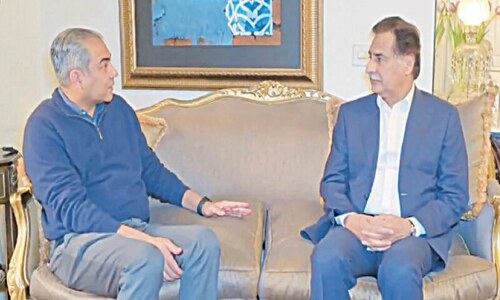At first glance, the new budget appears to show no significant tax rate hikes, but the removal of exemptions valued at up to Rs1.6 trillion will heavily impact the public. The budget’s architect has aimed to shift the financial burden onto the general populace while also prioritising the sale of loss-making state-owned enterprises (SOEs).
Although the sale of SOEs might help reduce government expenditures, it frequently leads to layoffs, all while the government continues to maintain its perks and privileges, such as free petrol and electricity, without cutting back on spending.
The government currently grapples with two major challenges: increasing revenue and reducing expenses. Revenue is crucial, as 94 per cent of the Federal Board of Revenue (FBR) income is allocated for debt servicing. This means the government must borrow funds for current and development expenditures, including the defence budget.
A major concern is who will decide which income sources to target for taxation and how much spending will be slashed. In developing countries like Pakistan, policymakers frequently deflect blame for their failures while quickly taking credit for any successes. Without hesitation, Prime Minister Shehbaz Sharif, Finance Minister Muhammad Aurangzeb and FBR officials all describe these unprecedented taxes as IMF diktat.
Govt plans to sell SOEs to cut its spending, but continues to maintain perks like free petrol, electricity
Economist Dr Ashfaq H. Khan stated that the IMF provided this budget to the Ministry of Finance with the condition that it must be included if Pakistan wants to enter a new loan programme.
Dr Khan criticised the budget, claiming its primary goal is to create social upheaval and industrial shutdowns, arguing that none of the budgetary targets are realistic in the current economic environment. He predicted additional slippages in deficits, leading to more borrowing and debt accumulation, and suggested lowering interest rates to 10-12 per cent until June 2025.
Dr Khan highlighted that this approach conceals the FBR’s failure to manage or develop alternative tax plans to help the most disadvantaged. The IMF consistently recommends increasing the tax-to-GDP ratio and reducing the fiscal deficit. It is up to the FBR and the finance ministry to create their own tax proposals instead of adopting measures from other countries.
One major issue with the 2024-25 budget is the lack of clear direction. It appears that every five years, FBR tax proposals undermine the positive impact of previous tax initiatives on sector development. The FBR has attracted large domestic and foreign real estate investments through amnesty schemes and other incentives. However, the sector has faced various tax measures, stalling sales and preventing further individual investments. The estimated real estate tax collection is also falling short.
More tax, less revenue
Economist Arthur Laffer, known for the Laffer curve theory, illustrates that increasing tax rates beyond a certain point can hinder revenue generation. Sectoral analysis shows that high taxation has led to a decline in revenue collection from these sectors.
Policymakers at the FBR appear to lack a clear understanding, relying heavily on assumptions. The recent tax rate rise on first-class and business-class international air tickets has resulted in fewer people opting for these tickets, reducing potential tax revenue.
The IMF needs money for debt servicing. The partial exemptions on hospitals, non-profit organisations and textbooks are offset by new tax measures on real estate, cement, lubricants and air tickets. The FBR has also taxed stationery, milk and baby milk. The tax authority has failed to effectively guide all stakeholders, including the IMF, on budget proposals.
Income tax for three sectors was overlooked in the budget. Retailer taxation seems unplanned. This sector is vital, and the FBR is pleased with shopkeeper registration, but the real challenge is collecting revenue from this neglected area. Punjab and Sindh budgets regularly disregard farm income tax. This sector, which is exempt from income tax, needs to be considered for taxation.
The wealthy living in large farmhouses and owning million-rupee cars highlight this disparity. In Brazil, luxury vehicle importers must show they paid the same taxes the previous year and pay a percentage of the new car’s value. The government is taxing farmhouses in Islamabad, but why not nationwide?
Dr Abid Suleri, a development economist, believes that increasing tax rates for those already in the tax net while failing to include those who should be taxed is unsustainable. Pakistan’s current budget bill, as has been the case in the past, relies heavily on indirect taxes, exacerbating economic inequality.
Changes in tariff structures or value affect import volumes. Tax increases will raise business ancillary costs, which are already high. These tax measures will harm documented businesses while benefiting smugglers, middlemen and suppliers nationwide. High regular import tax rates also encourage smuggling, an issue overlooked in the budget.
The FBR must be proactive and pre-emptive rather than reactive to IMF demands. There is still time for the tax authority to play a significant role in steering the country out of this crisis rather than simply adhering to IMF diktats.
Published in Dawn, June 30th, 2024
















































Dear visitor, the comments section is undergoing an overhaul and will return soon.